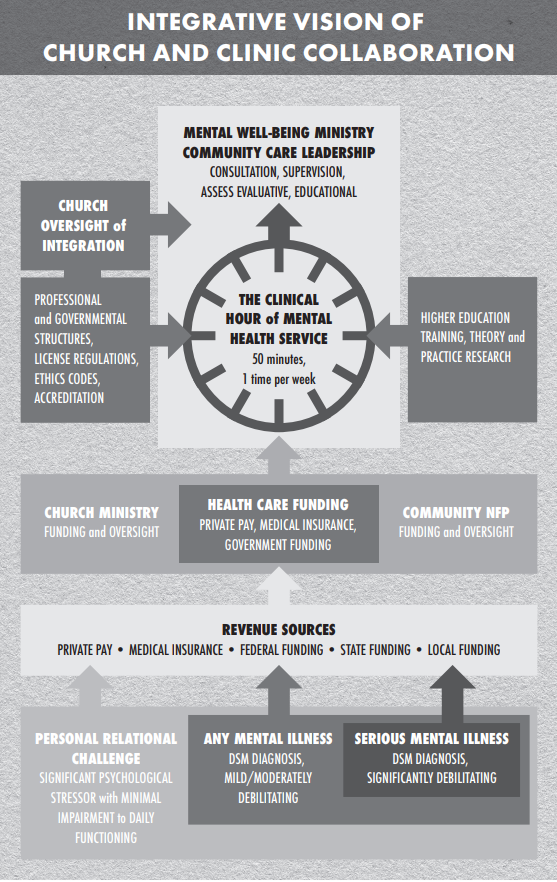[This article is part of a series of books we have reviewed over the years. Click the link to check out all the other books we’ve reviewed here.]
Jim Sells, Amy Trout, and Heather Sells collaborated to bring together a book out of necessity in seeing some of the shortcomings within the mental health profession. It is no secret as we have shared about the national shortage of counselors, so this book looks at how the Church can and has an obligation to come alongside those with mental illness to serve them better. Why this important, how you go about it, and concerns you should be aware of is the structure of Beyond the Clinical Hour.
I want to be upfront with this review and state that this is the book that I want to write, so I found myself being very critical of it as I have thought through many times what could be written about this topic. Yet, as I read it, I would find points where I disagreed or was discouraged they didn’t write more about, to find they later would weave several other points together and cover, or at least mention, all of the necessary points.
The Good
While I said this is the book I wanted to write, I definitely cannot state that I could have written it better. The amount of time in diving into research articles, interviewing organizations that are doing the work (of which we are on that is briefly featured), and offering practical tips into mental health professionals collaborating, supervising, and furthering the cause is exceptional. I find I want to offer solutions (which makes sense as a core treatment model I have is Solution Focused Brief Therapy), but Jim, Amy, and Heather did the work to discuss the why first. One of the easiest wins from the book is their Integrative Vision of Church and Clinic Collaboration (displayed below). I have seen discussions about faith integration to treatment as well as holistic models of counseling for Christians alongside the church, but this is an additional model that needs to be discussed and utilized.

I deeply respect the positive approach they have for wanting to see the Church step in, the encouragement they give Christian counselors to step into a new role that could greatly benefit their communities, and the thorough details laid out to help people consider changing how they approach serving people with mental illness symptoms.
The Bad
I want to preface my critiques of this book by saying that I am deeply involved in wanting to see the Church and mental health professionals do more, better, together. I have thought about this at length more times than I can count. My desire is to hit every point, talk about every therapy model, and discuss the nuances of church denominational integration with mental health, or the lack of resources for small, rural churches. I have a deep understanding of ethics and even funding sources for the proposed ideas in this book that include barriers and opportunities not mentioned. But that book would be long and drawn out, missing the overall target of this book for the general population.
With that context, I think it is important to note that while they focus on attachment theory as “the” therapy model which is a good modality for churches to use, I note that several models have as much opportunity for integration. This includes Dialectic Behavioral Therapy with mindfulness practices that have deep opportunities with communion and the Last Supper, prayer, and good hermeneutics as well as Systems theory which encompasses these relationships within our personal family, church family, and big ‘C’ Church family across the world and time. I would have loved a bit deeper dive into these topics.
Secondly, I think the book dives quickly into the need for churches to support mental health efforts and Christian counselors to start collaborating more, but the truth of the matter is that it is so much more difficult to pull off. There are significant ethical, legal, and even stigma barriers to address. I feel like churches have started to talk about mental health more thanks to initiatives like Sanctuary Mental Health Ministries, but topics of schizophrenia or substance misuse, long-term treatment and support with diagnoses such as Borderline Personality Disorder and Obsessive Compulsive Disorder, or even our response to suicidality and ideation while being a Christian are still far from accepted within the Church.
Conclusion
In spite of this having some critiques, the book is absolutely worth it and should not take away from what is written. If you are a church that wants to consider a mental health ministry, this needs to be on your bookshelf. If you are a Christian counselor that wants to redefine your practice or grow it, this book has solid wisdom and a plan of success within it. Overall, I’d give the book a 4.5 out of 5.
![Beyond the Clinical Hour [Book Review]](https://churchandmentalhealth.com/wp-content/uploads/2024/08/Beyond-the-Clinical-Hour-880x360.jpg)